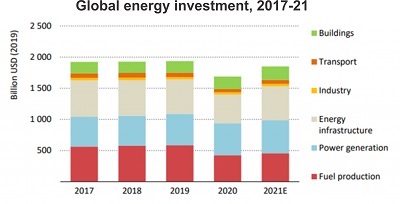Indian Economy
World Energy Investment Report, 2021: IEA
- 05 Jun 2021
- 6 min read
Why in News
Recently, the International Energy Agency (IEA) published the World Energy Investment Report, 2021.
Key Points
- Increased Investment in Energy Sector:
- Global energy investment is expected to rebound in 2021 and increase 10% year-on-year to around USD 1.9 trillion.
- Most of this investment will flow towards power and end-use sectors, shifting out of traditional fossil fuel production.
- The scenario is perfectly aligned with the projection that global energy demand will rise 4.6% year-on-year in 2021, offsetting its contraction in 2020.
- Renewable Energy:
- Renewable power will have the largest share - around 70% of the total will be spent on new power generation capacity.
- There will be substantial gain of renewable energy as the future energy outlook has been dependent on technological development, well-established supply chain and demand from consumers for carbon-neutral electricity.
- Fossil Fuels:
- Upstream (production and exploration) investment in oil is expected to grow 10%. This expansion in fossil fuels was planned with novel technologies like Carbon Capture and Storage (CCS) and bioenergy CCS, which are yet to attain commercial success.
- The increment of coal-fired power in 2020, mostly driven by China, is indicating that coal is down but not yet out.
- Increased Emissions:
- The above positive scenarios will still not deter the increase in carbon dioxide emission, after contraction in 2020 mainly due to economic slowdown induced by the novel coronavirus pandemic.
- Global emission is set to grow by 1.5 billion tonnes in 2021.
- Many developing nations’ supporting policy and regulatory frameworks are not yet aligned with long-term net-zero goals.
- Net zero emissions refers to achieving an overall balance between greenhouse gas emissions produced and greenhouse gas emissions taken out of the atmosphere.
- In many Emerging Market and Developing Economies (EMDEs), investment in renewables was hit harder by Covid-19 than in developed nations – and now many EMDEs have prioritised coal and oil in recovery plans.
- The above positive scenarios will still not deter the increase in carbon dioxide emission, after contraction in 2020 mainly due to economic slowdown induced by the novel coronavirus pandemic.
- Reasons of Increased Emissions:
- The emerging market is almost 70% responsible for demand growth and India plays an important part in this block.
- China is showing a tremendous expansion in coal-based power production — their coal consumption in December 2020 was a historic high — though the country has a commendable renewable growth.
- The responsibility-share of developed nations should not be undermined. Their in-country growth of emission is moderate but their exported emission is of concern.
- Australia’s exported emission through coal is double its domestic emission.
- Although the US has shown renewed commitment to the multilateral United Nations system for tackling climate change by re-joining the Paris agreement. Its fascination with cheap shale gas is creating an investment distortion and adversely affecting the sustainability of developmental pathways of countries like India.
International Energy Agency
- About:
- It is an autonomous Intergovernmental Organisation established in 1974 in Paris, France.
- IEA mainly focuses on its energy policies which include economic development, energy security and environmental protection. These policies are also known as the 3 E’s of IEA.
- India and IEA:
- India became an Associate member of IEA in March 2017 but it was in engagement with IEA long before its association with the organization.
- Recently, India has inked a Strategic Partnership Agreement with the IEA to strengthen cooperation in global energy security, stability and sustainability.
- IEA Clean Coal Centre:
- It is dedicated to providing independent information and analysis on how coal can become a cleaner source of energy, compatible with the UN Sustainable Development Goals.
- Reports:
- World Energy Investment Report, World Energy Outlook Report, Global Energy Review.
- Recently, it has released the India Energy Outlook 2021 Report and Net Zero by 2050, World's first comprehensive energy roadmap.
Way Forward
- Market stimulus amid the pandemic may have lost the opportunity to maximise the clean developmental pathway, which the world is in dire need of.
- The urgency visible in communication is still not satisfactorily reflected in action and the world is far away from the scientific target of limiting climate change within two degrees Celsius.
- A more democratic decision-making process and de-corporatisation of the energy sector is the need of the future for the survival of civilization on this planet.





